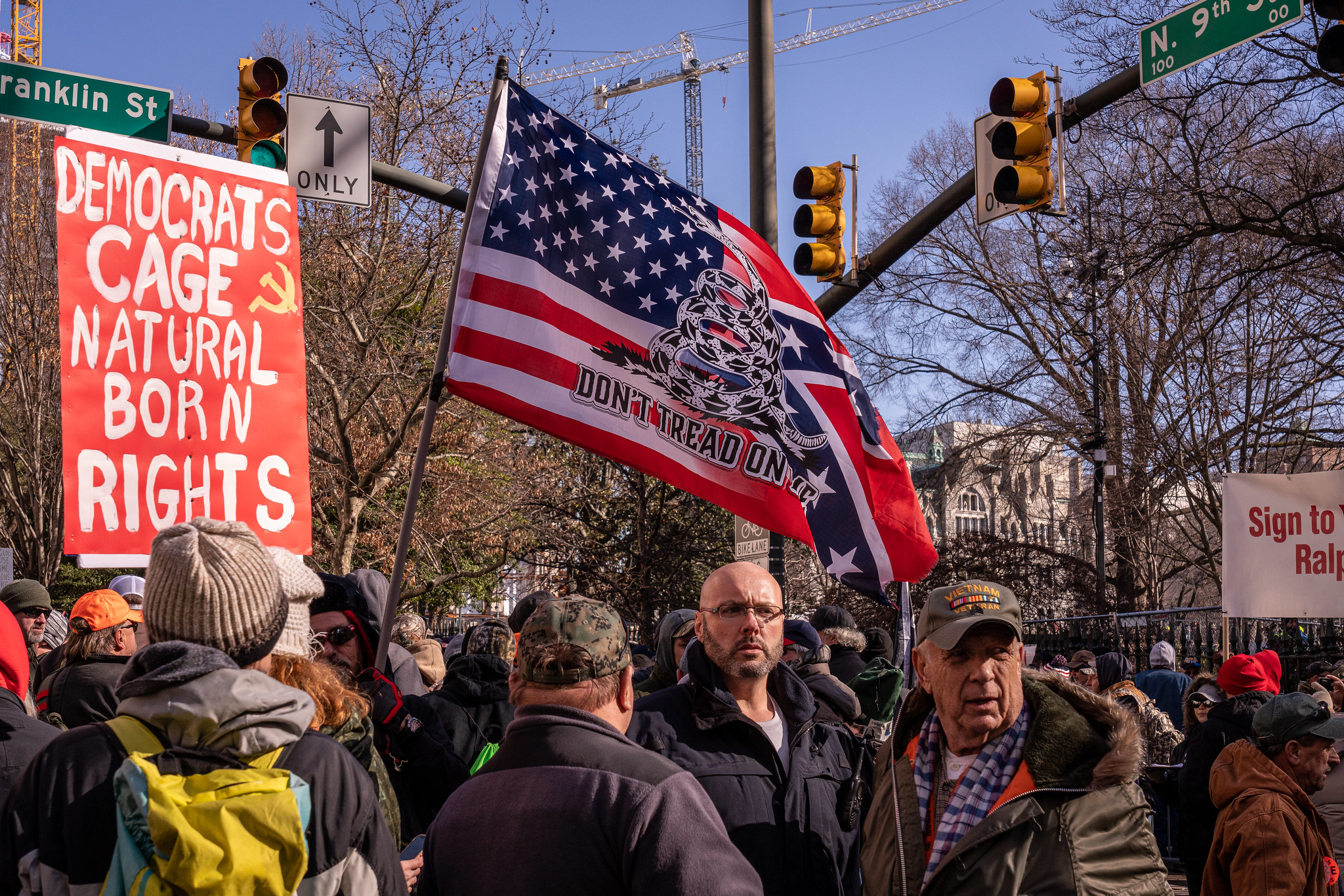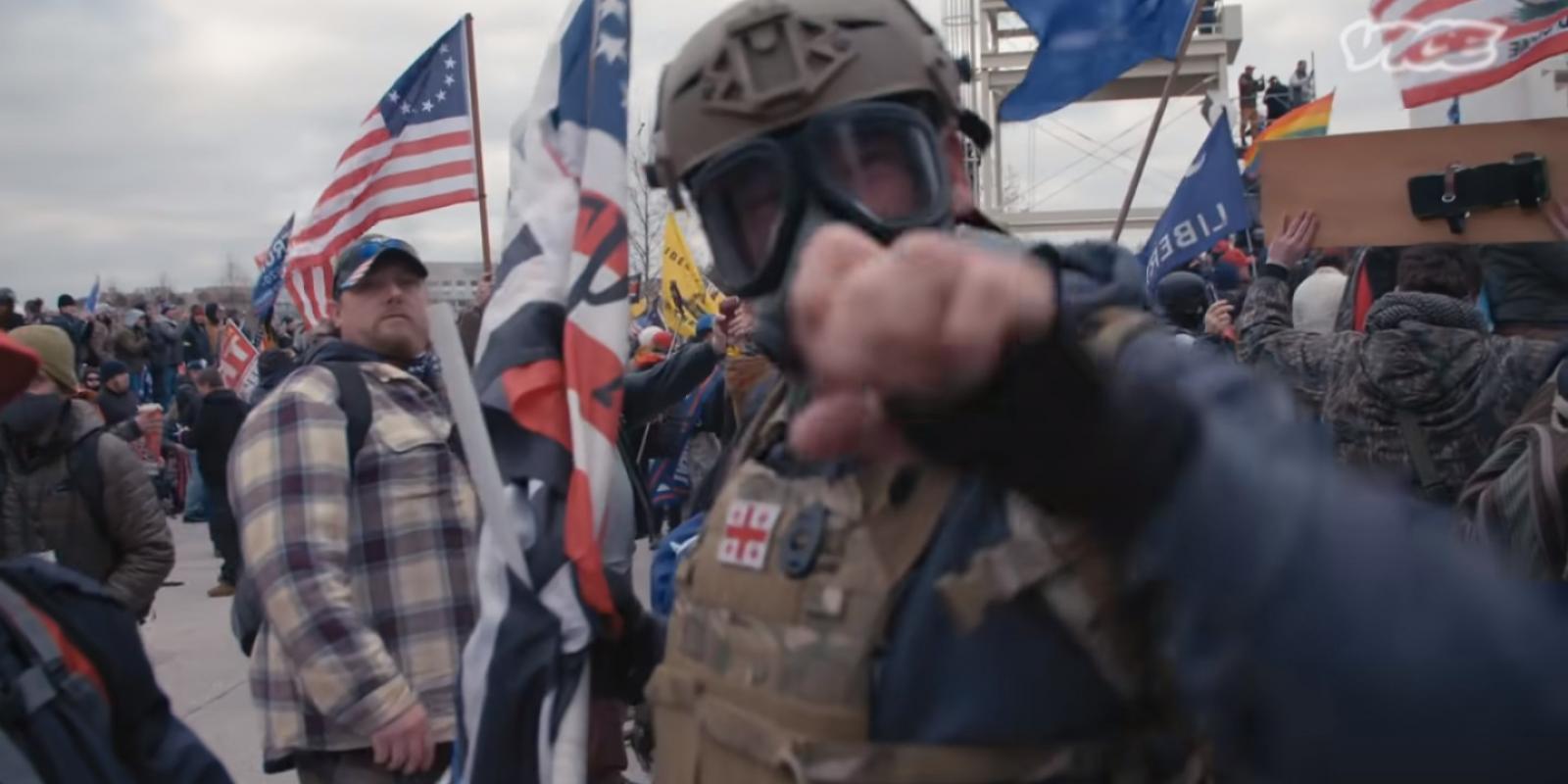It’s been a couple weeks since it was making headlines, but I wanted to flag a couple excellent articles about the Kyle Rittenhouse verdict and the larger threat of right-wing political violence in the United States. Zach Beauchamp and Adam Serwer both place Rittenhouse’s acquittal in the larger context of a radicalizing right wing, with Serwer delving deeper into the white supremacist mindset at the heart of the gun rights ideology. Both make the essential point that the Rittenhouse case, in Beauchamp’s words, “has revealed a scary convergence between the fringe and the mainstream on the wisdom of turning guns against their political enemies. Its resolution validates that belief in ways that challenge the basic nonviolent compact at the heart of democratic political life.” He continues:
Rittenhouse is a powerful symbol for the right because he acted out a long-held fantasy — a man with his gun, standing up to the liberal hordes. That he was found not guilty is validation that fantasy could be made reality, a godsend to genuine extremists.
But his acquittal’s celebration across a much broader spectrum of the right is perhaps even more troubling. It threatens the mainstream consensus that political violence has no place in a democratic society — and the related notion that Americans need to share a country with people who disagree with them.
Of all the parlous recent developments in American politics, the right’s effort to normalize violence against its opponents takes the cake as the single most ominous one — after all, it’s not much of a free society or democracy when the rule of law succumbs to the rule of the gun. There are plenty of failed states around the world to let us know what that looks like, and the fact that we have to contemplate such a possible future for the United States is something of a waking nightmare. But as disorienting as it is, we need to look at the most frightening and disheartening aspects of our situation unflinchingly, because it is only by acknowledging them that we can properly confront them.
With far-right actors willing to kill their imagined political enemies, and the Republican Party increasingly comfortable with accommodating this mindset, the future of our democracy lies not simply in stopping the spread of violence, but in creating an overwhelming backlash to such depraved attitudes and actions in order to delegitimize both the insurrectionist right and the GOP.
These tactics are intended to strike fear and disarray into Democratic and pro-democracy voters. In response, Democrats and defenders of democracy must work to ensure that the violence and intimidation directed against our democracy arouses not just anger, but rage against those who would replace the rule of law with the law of the jungle. As crucial as it is that journalists and news outlets cover right-wing violence and GOP complicity in order to inform Americans of the danger, it is simply not enough that writers like Beauchamp, Serwer, and Eric Boehlert are communicating to the public the dangerous dynamics at play; we need Democratic politicians to talk about this threat to their voters and to the public at large, to make the moral and emotional case that anyone who uses, or encourages, violence in this country to gain political power should be considered persona non grata in the public sphere, and that supporters of democracy need to make their voices heard at all levels of society, from civic institutions like election boards to casting votes for politicians who defend our form of government. Such a hard line is essential in the face of right-wing efforts to blur the lines and to insist on a sick continuity between the bullet and the ballot box.
The right-wing movement towards violence rests partially on a fantasy that it is actually the left that is responsible for political violence in America; witness the many outlandish stories of murderous antifa and city-burning Black Lives Matter protesters that are a staple of right-wing outlets like Fox News and OANN. Against this, Democratic politicians need to say plainly what right-wing violence actually aims at: the injury and murder of innocent Americans, whether they’re exercising their rights to protest, to worship, to carry out their duties as elected officials, or to simply go shopping at a mall in El Paso.
The horrific imbalance between deranged right-wingers bent on killing, and innocent Americans living their lives, must always be kept in view. Right-wing violence has no connection to legitimate political action. Trying to hang Mike Pence because he wouldn’t perform unconstitutional actions is not justifiable by any sane metric.
Though there have been numerous incidents of right-wing violence and intimidation over the last several years — including the Rittenhouse shootings, the Tree of Life synagogue murders, and the occupation of the Michigan capitol building and plot to kidnap that state’s governor, to name a few — it is the January 6 attack on the U.S. Capitol that most powerfully demonstrates the linkages between the Republican Party and a growing propensity on the right to deploy violence to achieve political ends. A Republican president incited a bloody-minded mix of militia types, white supremacists, and radicalized individuals to storm the Capitol and keep him in power by whatever means necessary, including the violent intimidation and near-murder of U.S. senators and representatives (and this is to say nothing of the many corrupt, non-violent machinations Trump employed in the weeks prior to January 6 to attempt to remain in office). We literally have hundreds of hours of video evidence of the derangement and danger of far-right insurrectionists smashing apart the Capitol, assaulting and maiming Capitol police officers, and shouting for the deaths of U.S. elected officials; the public record could not be clearer. It could also not be clearer that in the weeks and months following the assault, the bulk of the Republican Party made itself complicit in the violence of that day by continuing to support the former president’s false claims of a stolen election — the very cause for which the perpetrators of January 6 acted. We are still learning about the extent of coordination between the White House, Republican congresspeople, and the violence at the Capitol, but even what we know already is sufficient to stain the GOP at large with the infamy and violence of that day.
So there is no path forward that doesn’t include condemnation of GOP-Trumpist violence and intimidation as part of the Democratic Party’s claim to be America’s sole major party of democracy, and to discredit the GOP in the eyes of American voters. It is not enough to decry political violence; Democrats need to explicitly make the case that any support of political violence, such as when GOP representatives offer a congressional internship to the poster child for recent political vigilantism, is a demonstration of the GOP’s unfitness for power. They cannot treat this a some sort of side issue — it is a looming threat to American democracy, and they can communicate this by acting like it, not only in their words but also through their actions, such as legislation that clarifies and expands laws around political intimidation. Ultimately, it’s up to the GOP’s political opposition to mobilize such public sentiment, to actually do something about the dangers we face, and to inflict as severe a political price as possible on the Republican Party. Without political pushback, there are no conceivable impediments to the right-wing tendency towards violence. And as I suggested above, a powerful starting point would be intensified Democratic focus on the January 6 insurrection and Donald Trump’s incitement of right-wing violence against the U.S. government, which can illuminate the broader bloody-minded assault on American voters and institutions even as it constitutes an unspeakable political crime in its own right.

The right-wing effort to legitimize violence requires lies about Democrats and the left, seeking to shift responsibility for initiating violence on to them. This goes beyond lies about the threat posed by antifa; as Beauchamp and Serwer both suggest, the Big Lie that Democrats stole the 2020 election serves as justification to take back America by any means necessary. The effort seeks to blur the lines between democracy and violence, to make it seem as if they can coexist, when the truth is that violence is the enemy of a democratic society. The Democrats must hold this line, and persuade as many Americans as possible that those who use violence and intimidation to achieve their political ends are democracy’s enemies. While the right wing would love to believe that they are fighting a heroic battle against armed adversaries, what they actually envision is violence and murder directed at unarmed innocents. This is not a rhetorical fight that the Republican Party can be allowed to win, to say nothing of allowing actual violent acts to subvert and destroy our democracy.
Moreover, such pushback isn’t just needed for its own sake — going as hard as possible against right-wing violence and intimidation can also play a key role in unraveling the rest of the GOP’s anti-democratic agenda, as such violence exists on a continuum with other anti-democratic attacks. Here’s Serwer again:
The party finds the apocalyptic fear of impending leftist tyranny useful not only for turning out its supporters, but also for rationalizing legislative attempts to disenfranchise, gerrymander, and otherwise nullify the votes of Democratic constituencies. Engineering the American political system so that Republicans’ political rivals are unable to contest their power is a less forceful solution than killing people, but the political goal is similar: to never have to share power with those they disagree with.
The propensity towards violence is on a spectrum with the desire to undo American elections, rooted in the same rotten authoritarian soil; turning actual violence into a rhetorical weapon to bludgeon the GOP for their entire anti-democratic justice would be poetic and necessary justice.
Finally, it’s also important for the Democrats to engage anew with the lack a regulatory or moral regime that could stem the tide of everyday gun violence that slaughters thousands of American annually — a bloody phenomenon that, as Ruth Ben-Ghiat argues, has played a role in America’s slide towards authoritarianism and further bloodshed:
The scale and scope of gun violence in America doesn’t just desensitize us to violence. It also cheapens the value of life. It fosters political, social and psychological conditions that are propitious for autocracy. The omission of gun law reform from discussions of democracy protection is symptomatic of our normalization of this tragic situation. The Jan. 6 insurrection shows us how dangerous that blind spot has become.
From this perspective, the eagerness of some on the political right for outright violence partakes of a broader national illness in which we are already accustomed to firearms disrupting the social peace and destroying countless lives. Citizens are more prepared to commit violence, and others are prepared to tacitly accept it, when criminal gun violence already wracks the nation. Likewise, this mayhem fosters the authoritarian mindset that leads to acceptance of authoritarian rule and the enactment of political — that is, anti-democratic — violence. As others have noted, Democrats, by supporting gun control and sending the unmistakable message that gun violence is a crisis for our country, can make clear that they are the party of law and order, against the GOP’s indifference to mass death, fear, and vigilantism. To defeat GOP authoritarianism, both the right-wing embrace of violence and the generalized gun violence of American society require direct, unwavering confrontation.
